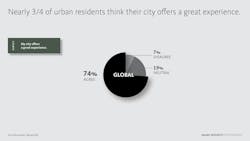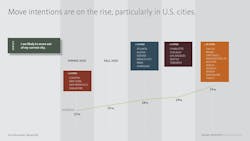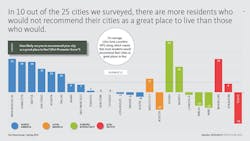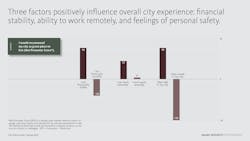The impacts of affordability, remote work, and personal safety on urban life
Cities today are at a crossroads: most urban residents believe that their city provides a great experience, but two out of three urban residents believe we should completely rethink city life for a post-pandemic world.
For Gensler’s Spring 2022 City Pulse Survey, we surveyed 12,500 residents of 25 urban centers around the world to understand how they feel about their cities today and what improvements could build a better future. Our respondents come from cities in four global regions: North America (Atlanta, Austin, Charlotte, Chicago, Dallas, Denver, Los Angeles, Miami, New York, San Diego, San Francisco, Seattle, Toronto, and Washington, D.C.), Latin America (Bogota and Mexico City), Europe/Middle East (Berlin, London, Munich, Riyadh, and Paris), and Asia-Pacific (Bangalore, Shanghai, Singapore, and Tokyo).
Their responses provide key insights into what cities must do to attract and retain residents in these uncertain times.
People are satisfied with their city’s experience, but that may not be enough.
Most (74%) urban residents around the world think that their city offers a great experience. Satisfaction with city experience is fairly stable across regions, with North American respondents recording the highest levels of satisfaction (77%) and Latin American respondents recording the lowest levels of satisfaction (68%). Experience ratings also remained similar across respondents of different races in U.S. cities and among people that own their properties vs. people who rent.
When looking at the data by generation, we found that younger generations (Gen Z and Millennials) were more likely to feel that a city provides a great experience than Gen X and Baby Boomer respondents. Income level creates the most variation in agreement for this statement. People who identified as belonging to the highest income class in their city were 1.5x more likely to feel that their city provides a great experience than people who feel they belong in the lowest income group.
Over one-third of respondents say they are likely to move out of their current city.
Move intentions are on the rise in cities around the world, particularly in North America. We’ve asked respondents about their likelihood to move since Gensler’s first City Pulse Survey in 2020. As we’ve added more cities throughout the past two years, we’ve also seen increases in the average desire to relocate.
In Spring 2020, the global average of people who wanted to move out of their city was 23%. Today, it is 35%. When looking at the data by individual city, respondents from U.S. cities are nearly 1.5x more likely to want to move from their current cities than the average of those from non-U.S. cities.
Despite high levels of satisfaction with their urban experience, many residents would not recommend their cities as great places to live.
We asked respondents how likely they would be to recommend their city as a great place to live. We measured their responses using something called a Net Promoter Score (NPS). An NPS is a widely used marketing metric that gauges customer loyalty and satisfaction by asking respondents to rate the likelihood that they recommend a place, company, product, or service to a friend or colleague. In this case, if a city has a positive NPS score, it means that it has an average of more people who would recommend their city as a great place to live than people who wouldn’t. With so many people agreeing that their city provides a great experience, we expected NPS scores to be overwhelmingly positive.
However, 40% of the cities we surveyed have a negative NPS score, meaning that they have more detractors than promoters. Cities like Austin, Berlin, and Denver have a negative NPS, despite at least 70% of residents in those locations agreeing that their city provides a great experience. This suggests that city experience and livability may be separate issues.
People are more like to recommend their cities as great places to live if they are financially stable, can work remotely, and feel safe in their city.
We wanted to understand what characteristics and conditions make a person more likely to recommend their city as a great place to live, feel that their city provides a great experience, and feel optimistic about their city’s future. Our data uncovered three factors that positively influence overall city experience: financial stability, options for remote work, and personal safety. People who feel financially stable have an NPS score that is 58 points higher than people who do not feel financially stable. They are also 1.5x more likely to say that their city provides a great experience.
Similarly, people who can work remotely have an NPS score that is 20 points higher than people who do not have the option to work from home, and less than half of urban residents who cannot work remotely feel optimistic about their city’s future. Finally, people who feel safe in their cities have an NPS that is 88 points higher than people who do not feel safe. They are also nearly twice as likely to feel that their city provides a great experience.
How can we reimagine city life for the future?
These findings led us to focus our Spring 2022 survey on three areas in which the pandemic has triggered seismic shifts at personal and societal levels: affordability, work, and safety. We offer a glimpse into how people feel about their financial situations and city-related expenses, as well as the trade-offs and sacrifices they’ve made (or are willing to make) to stay financially solvent. Next, we explore the impact that hybrid work has on city perception and move intentions.
We then conclude the report with findings related to both personal and public safety, outlining how cities can help residents feel safer as we continue to navigate uncertain times. By centering the voices of people from a variety of regions, generations, and income groups, we hope to provide cutting-edge insights into cities around the world directly from their most important stakeholders: their residents.
For more information about how cities can meet the needs of all residents, now and in the future, download Gensler’s Spring 2022 City Pulse Survey here.




